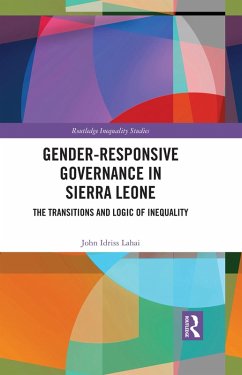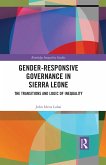John Idriss Lahai
Gender-Responsive Governance in Sierra Leone (eBook, ePUB)
The Transitions and Logic of Inequality
42,95 €
42,95 €
inkl. MwSt.
Sofort per Download lieferbar

21 °P sammeln
42,95 €
Als Download kaufen

42,95 €
inkl. MwSt.
Sofort per Download lieferbar

21 °P sammeln
Jetzt verschenken
Alle Infos zum eBook verschenken
42,95 €
inkl. MwSt.
Sofort per Download lieferbar
Alle Infos zum eBook verschenken

21 °P sammeln
John Idriss Lahai
Gender-Responsive Governance in Sierra Leone (eBook, ePUB)
The Transitions and Logic of Inequality
- Format: ePub
- Merkliste
- Auf die Merkliste
- Bewerten Bewerten
- Teilen
- Produkt teilen
- Produkterinnerung
- Produkterinnerung

Bitte loggen Sie sich zunächst in Ihr Kundenkonto ein oder registrieren Sie sich bei
bücher.de, um das eBook-Abo tolino select nutzen zu können.
Hier können Sie sich einloggen
Hier können Sie sich einloggen
Sie sind bereits eingeloggt. Klicken Sie auf 2. tolino select Abo, um fortzufahren.

Bitte loggen Sie sich zunächst in Ihr Kundenkonto ein oder registrieren Sie sich bei bücher.de, um das eBook-Abo tolino select nutzen zu können.
This book investigates gender equality and women's empowerment in Sierra Leone, focusing in particular on women's interactions with the state and its development partners.
- Geräte: eReader
- mit Kopierschutz
- eBook Hilfe
Andere Kunden interessierten sich auch für
![Gender-Responsive Governance in Sierra Leone (eBook, PDF) Gender-Responsive Governance in Sierra Leone (eBook, PDF)]() John Idriss LahaiGender-Responsive Governance in Sierra Leone (eBook, PDF)42,95 €
John Idriss LahaiGender-Responsive Governance in Sierra Leone (eBook, PDF)42,95 €![Spectres of Reparation in South Africa (eBook, ePUB) Spectres of Reparation in South Africa (eBook, ePUB)]() Jaco Barnard-NaudeSpectres of Reparation in South Africa (eBook, ePUB)42,95 €
Jaco Barnard-NaudeSpectres of Reparation in South Africa (eBook, ePUB)42,95 €![Globalised Resistance and the Bring Back Our Girls Movement (eBook, ePUB) Globalised Resistance and the Bring Back Our Girls Movement (eBook, ePUB)]() Titilope F. AjayiGlobalised Resistance and the Bring Back Our Girls Movement (eBook, ePUB)42,95 €
Titilope F. AjayiGlobalised Resistance and the Bring Back Our Girls Movement (eBook, ePUB)42,95 €![The Political Economy of Land and Agrarian Development in Ethiopia (eBook, ePUB) The Political Economy of Land and Agrarian Development in Ethiopia (eBook, ePUB)]() Ketebo Abdiyo EnseneThe Political Economy of Land and Agrarian Development in Ethiopia (eBook, ePUB)42,95 €
Ketebo Abdiyo EnseneThe Political Economy of Land and Agrarian Development in Ethiopia (eBook, ePUB)42,95 €![Majority State Ownership of Oil and Mining Sectors in Africa (eBook, ePUB) Majority State Ownership of Oil and Mining Sectors in Africa (eBook, ePUB)]() John James QuinnMajority State Ownership of Oil and Mining Sectors in Africa (eBook, ePUB)42,95 €
John James QuinnMajority State Ownership of Oil and Mining Sectors in Africa (eBook, ePUB)42,95 €![The South African Response to COVID-19 (eBook, ePUB) The South African Response to COVID-19 (eBook, ePUB)]() The South African Response to COVID-19 (eBook, ePUB)0,00 €
The South African Response to COVID-19 (eBook, ePUB)0,00 €![Deconstructing Corruption in Africa (eBook, ePUB) Deconstructing Corruption in Africa (eBook, ePUB)]() Deconstructing Corruption in Africa (eBook, ePUB)41,95 €
Deconstructing Corruption in Africa (eBook, ePUB)41,95 €-
-
-
This book investigates gender equality and women's empowerment in Sierra Leone, focusing in particular on women's interactions with the state and its development partners.
Dieser Download kann aus rechtlichen Gründen nur mit Rechnungsadresse in A, B, BG, CY, CZ, D, DK, EW, E, FIN, F, GR, HR, H, IRL, I, LT, L, LR, M, NL, PL, P, R, S, SLO, SK ausgeliefert werden.
Produktdetails
- Produktdetails
- Verlag: Taylor & Francis eBooks
- Seitenzahl: 298
- Erscheinungstermin: 28. Juli 2023
- Englisch
- ISBN-13: 9781000901887
- Artikelnr.: 68340059
- Verlag: Taylor & Francis eBooks
- Seitenzahl: 298
- Erscheinungstermin: 28. Juli 2023
- Englisch
- ISBN-13: 9781000901887
- Artikelnr.: 68340059
- Herstellerkennzeichnung Die Herstellerinformationen sind derzeit nicht verfügbar.
John Idriss Lahai is a scholar in applied international development, gender and women studies, transitional justice and human rights, multi-level governance in fragile states, refugee and migration studies, human geography, regional planning, and peace and conflict studies. He is the author of over a dozen books published by Routledge and Palgrave Macmillan, among other internationally recognized academic publishing houses. He is currently an affiliate of the School of Geography and Sustainable Communities and The Australian Centre for Culture, Environment, Society and Space (ACCESS) of the University of Wollongong, New South Wales, Australia. Lahai sits on the advisory board of Rowman & Littlefield's newly constituted book series "Migration, Displacement, and Development." He has consulted/worked for several governments and international agencies (working on mitigating state fragility in the Global South).
Introduction; PART I: Theories, Concepts, and Issues; 1. Theorizing
Gender-Responsive Governance, Women's Agency and Empowerment, and the Logic
of (In)quality and Transitions to Equality; PART II: The Logic of
Inequality in the Bounded Spaces of Sexuality, Violence, and
Discrimination; 2. The Histories and Boundaries of State-Capture:
Sexuality, Power, and Belonging; 3. Locating Inequality in the Formal and
Informal Economic Sector; 4. How Society Created an Education Sector that
Propagated Inequality; 5. Politics, Electoral Violence, and Gender
Inequality; 6. Then Came the Era of a Civil War and Its Aftermath: Women's
Lives in War and Peace; PART III: The Logic and Transitions to
Gender-Responsive Governance, Equality, and Empowerment; 7. Feminizing the
Quasi-Institutional Interventions to End Sexual Violence; 8. Women, the
State, and the Rise of a Gender-Responsive Knowledge-Economy; 9. 'Let's
Quantify the Contributions of Women': Costing of Equality via
Gender-Responsive Budgeting; 10. Creating the 'Local State' and Expanding
the Decentralized Space for Women's Grassroots Political Participation
Gender-Responsive Governance, Women's Agency and Empowerment, and the Logic
of (In)quality and Transitions to Equality; PART II: The Logic of
Inequality in the Bounded Spaces of Sexuality, Violence, and
Discrimination; 2. The Histories and Boundaries of State-Capture:
Sexuality, Power, and Belonging; 3. Locating Inequality in the Formal and
Informal Economic Sector; 4. How Society Created an Education Sector that
Propagated Inequality; 5. Politics, Electoral Violence, and Gender
Inequality; 6. Then Came the Era of a Civil War and Its Aftermath: Women's
Lives in War and Peace; PART III: The Logic and Transitions to
Gender-Responsive Governance, Equality, and Empowerment; 7. Feminizing the
Quasi-Institutional Interventions to End Sexual Violence; 8. Women, the
State, and the Rise of a Gender-Responsive Knowledge-Economy; 9. 'Let's
Quantify the Contributions of Women': Costing of Equality via
Gender-Responsive Budgeting; 10. Creating the 'Local State' and Expanding
the Decentralized Space for Women's Grassroots Political Participation
Introduction; PART I: Theories, Concepts, and Issues; 1. Theorizing
Gender-Responsive Governance, Women's Agency and Empowerment, and the Logic
of (In)quality and Transitions to Equality; PART II: The Logic of
Inequality in the Bounded Spaces of Sexuality, Violence, and
Discrimination; 2. The Histories and Boundaries of State-Capture:
Sexuality, Power, and Belonging; 3. Locating Inequality in the Formal and
Informal Economic Sector; 4. How Society Created an Education Sector that
Propagated Inequality; 5. Politics, Electoral Violence, and Gender
Inequality; 6. Then Came the Era of a Civil War and Its Aftermath: Women's
Lives in War and Peace; PART III: The Logic and Transitions to
Gender-Responsive Governance, Equality, and Empowerment; 7. Feminizing the
Quasi-Institutional Interventions to End Sexual Violence; 8. Women, the
State, and the Rise of a Gender-Responsive Knowledge-Economy; 9. 'Let's
Quantify the Contributions of Women': Costing of Equality via
Gender-Responsive Budgeting; 10. Creating the 'Local State' and Expanding
the Decentralized Space for Women's Grassroots Political Participation
Gender-Responsive Governance, Women's Agency and Empowerment, and the Logic
of (In)quality and Transitions to Equality; PART II: The Logic of
Inequality in the Bounded Spaces of Sexuality, Violence, and
Discrimination; 2. The Histories and Boundaries of State-Capture:
Sexuality, Power, and Belonging; 3. Locating Inequality in the Formal and
Informal Economic Sector; 4. How Society Created an Education Sector that
Propagated Inequality; 5. Politics, Electoral Violence, and Gender
Inequality; 6. Then Came the Era of a Civil War and Its Aftermath: Women's
Lives in War and Peace; PART III: The Logic and Transitions to
Gender-Responsive Governance, Equality, and Empowerment; 7. Feminizing the
Quasi-Institutional Interventions to End Sexual Violence; 8. Women, the
State, and the Rise of a Gender-Responsive Knowledge-Economy; 9. 'Let's
Quantify the Contributions of Women': Costing of Equality via
Gender-Responsive Budgeting; 10. Creating the 'Local State' and Expanding
the Decentralized Space for Women's Grassroots Political Participation







